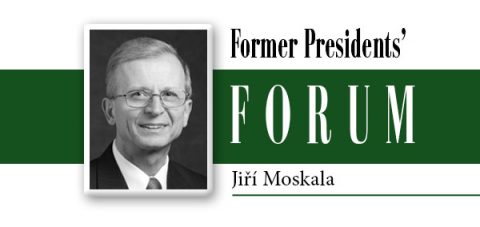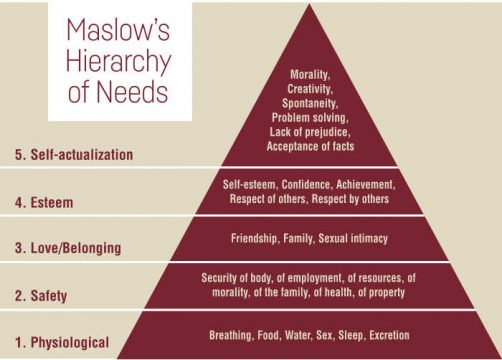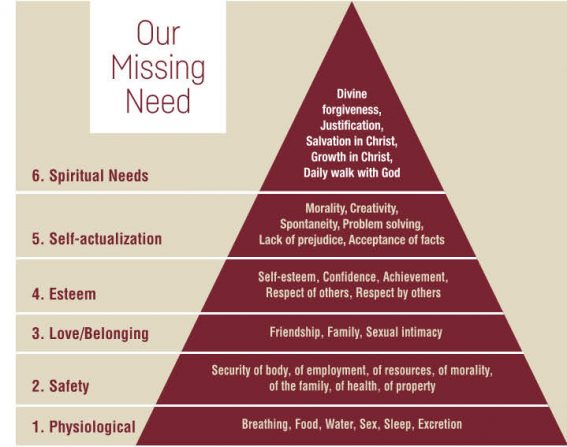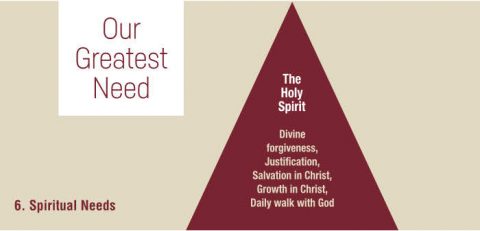
Our Greatest Need
Abraham Maslow in his famous paper “A Theory of Human Motivation”1 and more fully in his book Motivation and Personality2 proposed a hierarchy of our human needs. He studied the healthiest one percent of the college student population, on which he built his theory with five levels from the most fundamental needs to the more elaborate levels, summarized in the diagram below. Maslow’s popular theory suggests that the most basic level of needs must be met before the individual will strongly desire (or focus motivation upon) the higher-level needs.
He also coined the term metamotivation to describe that of people who go beyond the basic needs to strive for constant betterment. Metamotivated people are driven by being needs instead of deficiency needs. These needs go from the basics to the upper ones: physiological needs, safety and security needs, love and belonging, esteem, and self-actualization.

What is strikingly missing in Maslow’s pyramid are spiritual needs (need for divine forgiveness, reconciliation with God, worshiping our Creator, salvation in Christ, growing in God, walking with the Lord)—the spiritual dimensions of our being, our need for God! “He has also set eternity in the hearts of men” (Eccl. 3:11, NIV).3 St. Augustine wrote, “You have made us for yourself and restless is our heart until it comes to rest in you.”4 This may suggest a sixth level:

What do we need the most in our spiritual life? What is our greatest spiritual need? We all feel a lack of power in our lives. We want to be good and to do good, but feel weak and powerless, and often do the things we do not want to do. However, our God wants to help and lead us from the first step to the last. He wants to give us victory every day. How? By our total surrendering and commitment to God through His Holy Spirit! This should be the very apex of our pyramid of needs.

Thus, our greatest need is the presence of the Holy Spirit, because even our capitulation and surrendering to God come as the result of the Holy Spirit working in our life.
Jesus Christ stresses that God willingly and gladly gives His children the Holy Spirit: “‘If you then, though you are evil, know how to give good gifts to your children, how much more will your Father in heaven give the Holy Spirit to those who ask him!’” (Luke 11:13). Ellen G. White confirmed that our greatest need is the presence of the Holy Spirit in our lives, because in the gift of the Holy Spirit, all our needs are fulfilled. No wonder that “the donation of the Holy Spirit was the greatest gift God could bestow upon finite man.”5
Ellen G. White eloquently underscored this on many occasions. Consider carefully and prayerfully the following quotations:6
● “Repentance as well as forgiveness is the gift of God through Christ. It is through the influence of the Holy Spirit that we are convinced of sin, and feel our need of pardon. None but the contrite are forgiven; but it is the grace of the Lord that makes the heart penitent.”7
● “A revival of true godliness among us is the greatest and most urgent of all our needs. We must have the holy unction from God, the baptism of his Spirit. This is the only efficient agent in the promulgation of sacred truth. It is the Spirit of God that quickens the lifeless faculties of the soul to appreciate heavenly things, and attracts the affections toward God and the truth. What we need, what we cannot do without, is the power of the Holy Spirit to work with our efforts. All pampering of self must be at an end. There is a weakness of intellect, a lack of religious fervor, in those who want to lean upon others, to be petted, waited on, and propped up. There must be an earnest longing, a soul-hunger, for the presence of the Lord. Make him your support, your front guard and your rearward.”8
● “The Spirit of God, as it comes into the heart by faith, is the beginning of the life eternal. What promise is less fulfilled in the church than that of the endowment of the Holy Spirit? Here is our greatest need. Let the spirit of controversy be put away, and let us seek for the living testimony of the Spirit of God. The teacher must be baptized with the Holy Spirit. Then the mind and spirit of Christ will be in him, and he will confess Christ in a spiritual and holy life. He will give evidence that the truth he has received has not been merely in theory, but that he has been sanctified through the truth. He can talk of Christ and him crucified in language that savors of heaven. He can present the will of God to man because his own heart has been brought into submission, and has been glorified by the Spirit of God. The sun of righteousness is risen upon him, that he may reflect its brightness to the world.”9
● “We are altogether too indifferent in regard to the Holy Spirit, which is to take possession of heart and character. Those who are unenlightened by the Spirit of God can see only the things which are of the greatest importance in their human estimation. They mistake phantoms for realities, and realities for phantoms, calling a world an atom, and an atom a world. They need the Holy Spirit to control heart and mind, and to mold the character after the divine similitude. No one is safe in attempting to work without the Holy Spirit. The most powerful sermons may be preached, but the word spoken will be valueless unless it is accompanied by the Holy Spirit.”10
● “The Holy Spirit was the highest of all gifts that he could solicit from his Father for the exaltation of his people. The Spirit was to be given as a regenerating agent, and without this the sacrifice of Christ would have been of no avail. . . . Sin could be resisted and overcome only through the mighty agency of the third person of the Godhead, who would come with no modified energy, but in the fulness of divine power. It is the Spirit that makes effectual what has been wrought out by the world's Redeemer. It is by the Spirit that the heart is made pure. Through the Spirit the believer becomes a partaker of the divine nature. Christ has given his Spirit as a divine power to overcome all hereditary and cultivated tendencies to evil, and to impress his own character on his church.”11
● “Why do we not hunger and thirst for the gift of the Spirit, since this is the means by which we are to receive power? Why do we not talk of it, pray for it, preach concerning it? The Lord is more willing to give the Holy Spirit to us than parents are to give good gifts to their children. For the baptism of the Spirit every worker should be pleading with God.”12
● “This promised blessing, if claimed by faith, would bring all other blessings in its train, and it is to be given liberally to the people of God. Through the cunning devices of the enemy the minds of God's people seem to be incapable of comprehending and appropriating the promises of God. They seem to think that only the scantiest showers of grace are to fall upon the thirsty soul. . . . The power of God awaits their demand and reception.”13
●“The promise of the gift of the Spirit of God is left as a matter to be little considered by the church. It is not impressed upon the people, and the result is only that which might be expected,—spiritual drouth, spiritual darkness, spiritual declension and death. Minor matters occupy the mind and soul, but divine power which is necessary for the growth and prosperity of the church, which would, if possessed, bring all other blessings in its train, is lacking, although it is offered to us in infinite plentitude. Just as long as the church are satisfied with small things, they are disqualified to receive the great things of God. But why do we not hunger and thirst after the gift of the holy Spirit, since it is the means whereby the heart may be kept pure? . . . It is all-essential for the Christian to understand the meaning of the promise of the holy Spirit just prior to the coming of our Lord Jesus the second time. Talk of it, pray for it, preach concerning it.”14
If having the Holy Spirit is our greatest need, then we need carefully study what the Holy Scripture says about the Holy Spirit. Unfortunately, people usually approach this topic in a doctrinal way. They want to know if the Holy Spirit is an influence or a person, and they want to have the Holy Spirit! However, the main purpose that the Bible speaks about the Holy Spirit is not only to point to different functions of the Spirit of God, but to create a deep desire for His presence in our life. In reality it is God who wants to own us, and the issue is not that we “possess” the Holy Spirit, but that the Holy Spirit possesses us. Then we can be new and transformed people, and fulfill the task God has given us by ministering and serving others with joy, and living to the glory of God.
Let us humbly ask for the outpouring of the Holy Spirit in our lives that we can be transformed to God’s image, reflect His character, and be empowered by the Lord’s Spirit to fulfill God’s vision and task He is giving us. Let’s pray for the daily baptism of the Holy Spirit that He can do His work for us, in us, around us and through us.
The prophet Joel explains what God will do in the last days and promises: “‘I will pour out my Spirit on all people. Your sons and daughters will prophesy, your old men will dream dreams, your young men will see visions. Even on my servants, both men and women, I will pour out my Spirit in those days’” (Joel 2:28, 29). Let us pray with David: “Teach me to do your will, for you are my God. May your gracious Spirit lead me forward on a firm footing” (Ps. 143:10, NLT). Paul powerfully asserted: “All who are led by the Spirit of God are children of God” (Rom. 8:14, NLT).
NOTES AND REFERENCES
1. Abraham Maslow, “A Theory of Human Motivation,” Psychological Review 50:4 (1943): 370–396.
2. Abraham Maslow, Motivation and Personality (New York: Harper and Row, 1954).
3. Unless otherwise noted, all Scripture references in this column are quoted from The New International Version of the Bible.
4. Https://www.catholicjournal.us/2019/10/24/the-nature-of-augustines-confessions.
5. Ellen G. White, Manuscript Releases (Silver Spring, Md.: Ellen G. White Estate, 1990), 6:224. Italics supplied.
6. All italics are supplied.
7. “Consecration and Diligence in Christian Workers,” The Advent Review and Sabbath Herald 61:26 (June 24, 1884): 401, 402.
8. The Home Missionary (November 1, 1890), par. 26.
9. “On the Way to Australia,” The Advent Review and Sabbath Herald 69:6 (February 9, 1892): 82.
10. “Co-Workers With Christ,” ibid. 78:31 (July 30, 1901): 484.
11. “Christ’s Most Essential Gift to His Church,” ibid. 85:47 (November 19, 1908): 16.
12. Testimonies for the Church, 8:22.
13. Testimonies to Ministers and Gospel Workers, 174, 175.
14. “Imperative Necessity of Searching for Truth,” The Advent Review and Sabbath Herald 69:45 (November 15, 1892): 707.
1. Abraham Maslow, “A Theory of Human Motivation,” Psychological Review 50:4 (1943): 370–396.
2. Abraham Maslow, Motivation and Personality (New York: Harper and Row, 1954).
3. Unless otherwise noted, all Scripture references in this column are quoted from The New International Version of the Bible.
4. Https://www.catholicjournal.us/2019/10/24/the-nature-of-augustines-confessions.
5. Ellen G. White, Manuscript Releases (Silver Spring, Md.: Ellen G. White Estate, 1990), 6:224. Italics supplied.
6. All italics are supplied.
7. “Consecration and Diligence in Christian Workers,” The Advent Review and Sabbath Herald 61:26 (June 24, 1884): 401, 402.
8. The Home Missionary (November 1, 1890), par. 26.
9. “On the Way to Australia,” The Advent Review and Sabbath Herald 69:6 (February 9, 1892): 82.
10. “Co-Workers With Christ,” ibid. 78:31 (July 30, 1901): 484.
11. “Christ’s Most Essential Gift to His Church,” ibid. 85:47 (November 19, 1908): 16.
12. Testimonies for the Church, 8:22.
13. Testimonies to Ministers and Gospel Workers, 174, 175.
14. “Imperative Necessity of Searching for Truth,” The Advent Review and Sabbath Herald 69:45 (November 15, 1892): 707.
